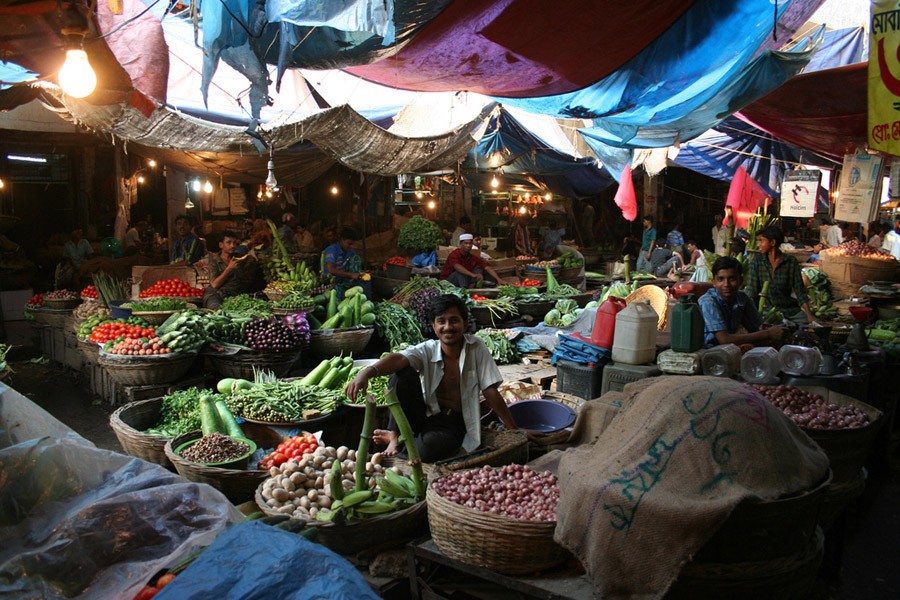Kitchen market appears to be highly volatile. At this time of early winter, prices of vegetables begin to come down gradually. This happens almost every year. But this year, things are pretty different. Galloping prices of vegetable items show no sign of cooling down.
Despite rising supply and fall in prices in the growing hubs, prices of vegetables are rising. A huge price gap ranging from 80 per cent to 233 per cent between the growers' level and city kitchen markets exists. The situation is seriously affecting limited income groups of people who are bearing the brunt.
Prices of onion, garlic and ginger top the list of the items that registered abnormal increase during the last few weeks. Local variety of onion is scarce in the kitchen market. It sells at Tk 120 to 140, where available. Indian variety of onion sells at Tk 65 to Tk 75 in retail markets.
The hike in onion price is due to phenomenal rise in prices in the major exporting country India, according to the local traders. But the market experts, on the other hand, blame it to be an artificially created one caused by the local syndicate.
It's a fact that the price of onion showed an uptrend and witnessed a 43 per cent increase from October. The prices went up in India due to heavy rains in two major onion-growing states also disrupted its supply.
According to the Consumers Association of Bangladesh (CAB), onions imported in September when price reached its lowest in India to Rs 08-12 a kg (Tk 10-Tk 15), are now being traded at Tk 55 - Tk 60 a kg at the wholesale markets in the city last week.
Despite the price surge in India, the import cost in Bangladesh should not be more than Tk 33 a kg. But the traders increased the price by more than 40 per cent on the excuse of price surge in India.
Most of other vegetables are traded between Tk 60 (pointed gourd) and Tk 160-Tk 180 (local bean) a kg now. Brinjal, bitter gourd, sponge gourd, ridge gourd, teasel gourd, lady's finger are selling at Tk 60-Tk 90 a kg in different markets in the city.
A medium-sized bottle gourd was selling at Tk 50-Tk 60, pumpkin at Tk 40-Tk 45 a kg and tomato at Tk 130-Tk 150 a kg. All kinds of leafy vegetables were sold at Tk 20-Tk 40 a bunch at retail which is a 10-month high. Early harvested cabbage and cauliflower were sold at Tk 40-Tk 60 each.
Market trend suggests that potato and papaya are the cheapest vegetables available in the city and elsewhere. Potato and papaya sell at Tk 20 to Tk 30 a kg. Prices of most of the vegetables also remained static at major wholesale markets in the city and elsewhere.
There is no denying that sky-high prices of vegetables are putting extra burden on the consumers already hit hard by rising prices of other essentials. But what is surprising is that local variety of onion is hardly available in the kitchen market. This means that stocks of the item has already exhausted from the markets.
The situation suggests that there is a need to produce improved variety of onion across the country. Agricultural experts say that supply shortage of onion can be largely overcome, if improved Indian variety of summer onion cultivation, already introduced in the northern region, is made popular across the country. The varieties were also widely accepted by farmers who got higher returns from their investment compared to the yield from previous varieties.
The shortfall can be gradually met in two or three years, if the newly-developed summer variety is promoted and farmers are given required technological support. Although the production cost is little higher than that of local variety, farmers will be doubly benefited-from bigger yield and higher market price.
High inflationary pressure has brought immense hardship for people of limited income group as prices of major food and vegetable items, including rice, reached their peak this year. According to the latest report of Bangladesh bureau of Statistics (BBS), food inflation increased 55 points in September last by hitting 7.87 per cent -- highest in last three years.
In the circumstances, there is a need to strictly monitor the rising trend of the essentials' prices in the kitchen market and do the needful to contain it.


